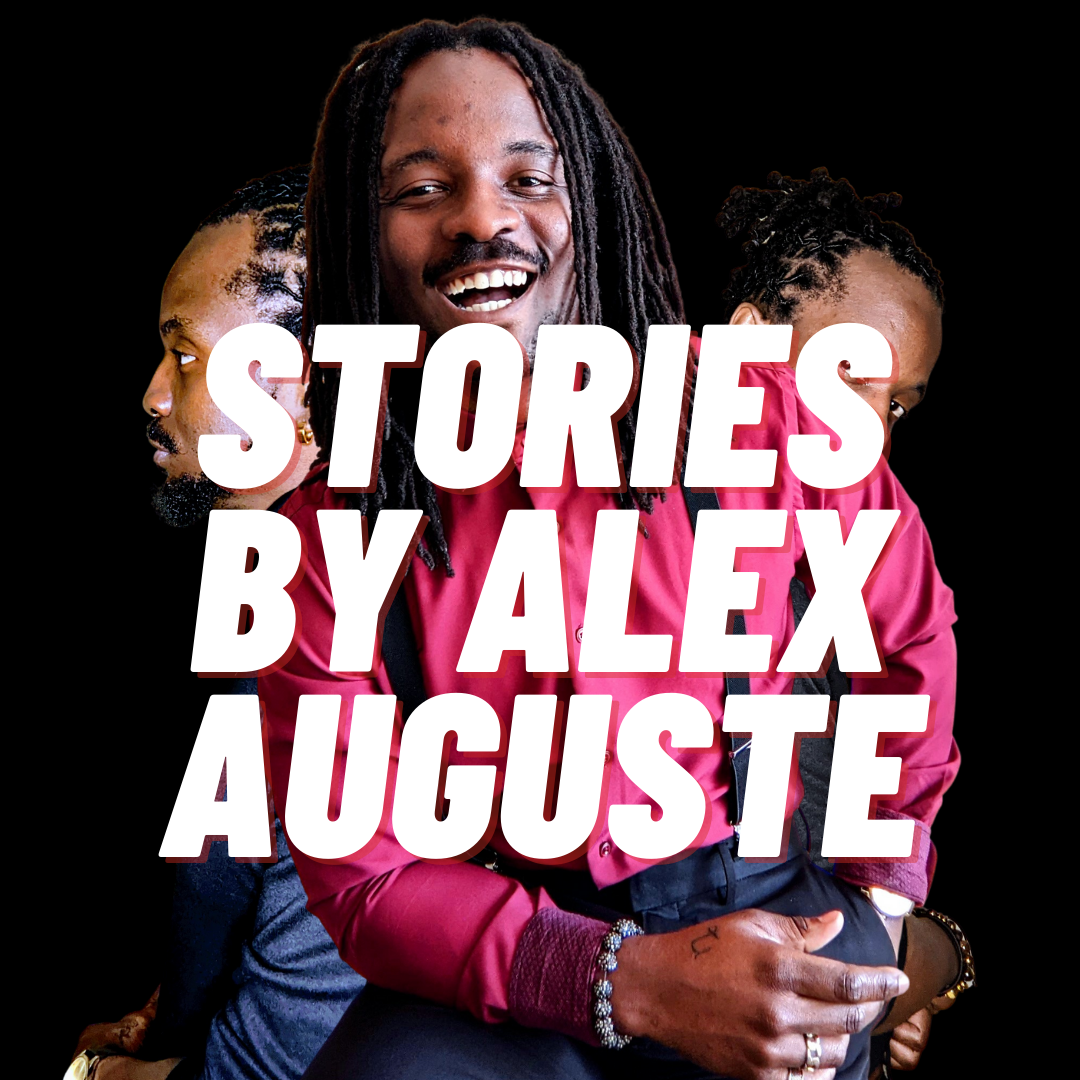Behind the Pages: How Mental Health, Grief, & Trauma Drove My Stories

If Art Imitates Life, It Was These Themes That Bring The Next Stories To Life.

In yesterday's post for I Am Alex Auguste, I shared some pretty extensive information about my upcoming books, their release dates, and some basics to the synopsis of each one. There's an even medium between giving audiences enough to want to follow and purchase a book, and just the right amount to keep it suspenseful so they actually enjoy the overall experience. That's still something I'm learning as I go on the author journey.
But yesterday felt good because there is so much to say about this next batch of six - yes, six - stories that are coming.
Read: A Little About A Lot of My Works In Progress
Releasing the information felt good because in the information, in the synopsis and summaries of all of these stories, are some deep talking points about themes like trauma, abuse, mental health, and grief.
MENTAL HEALTH
Contrary to the (unpopular) belief that Mental Health has become "trendy" (Ayo, I hate when y'all say that by the way), we live in a world where far more people have been effected by world events on a collective level. We're addressing the impacts of those events, we share in conversation how we feel, and more importantly, we've done away with any stigmas towards seeking access to mental health professionals. Despite us constantly being called "sensitive" and "woke" and all the other bullshit buzzwords, I actually think that makes us one of the strongest generations in the last decade, because self-awareness is a superpower in itself, while lack of it is a crippling weakness that - is crippling.
I find it empowering when artists use their craft to talk about their struggles with these topics, and have actually always gravitated towards music that goes down the vulnerable deep end without trying to force the music to be more relatable. It becomes reflection; it becomes storytelling; and in my opinion, it becomes timeless. From Ray Charles' blues of the 50s and 60s, to Kid Cudi's hums of the late-2010s, and now Kendrick Lamar's ripping off of the band-aids on his latest album Mr. Morale and the Big Steppers, that's what has always made music heartfelt to me. To hear trap beats, 808s, and rap music, but understand the silent contexts about struggle, recovery, and self-awareness makes it far more than just music and makes it art.
"That something includes admitting to a “lust addiction,” attending therapy, and reckoning with terrible childhood traumas. He compares this story line with the Black experience in America more broadly, illustrating how racism instills a sense of loss that festers dangerously within the communities it wounds." - Spencer Kornhaber on Kendrick Lamar's "Mr Morale & The Big Steppers for The Atlantic
Hear me out, Origins24 is not just fantasy. It's 24 methodical stories about reframing our purpose in life by understanding that mental health is normal in a world that will continuously resist allowing you to be who you're supposed to be.
In A Boy Bathed in Blood, Sterling John goes to see the Grace Family Patriarch and he begs him to write a note that he can travel back in time to deliver, so that Pretty Pete and Mary Silva can live. In the upcoming The Man on the Bridge, Sterling will make mention that he knows he can't go back to 1858, but also is afraid of going to the future because he may not fit in, or that he may run into moments that he was supposed to live. I modeled that from my own experiences with Depression and Chronic Anxiety Disorder. In 2019, I was diagnosed with Chronic Anxiety while also drowning in a deeply depressed state.

I learned so much about my own behaviors. A lot of them, though erratic at times, were attempts at controlling my panics. I'll give you an example. I hate being late. I hate feeling like I can't control my time of arrival, and so I started setting timers for everything in my life. If you've ever been on an outing with me, and suddenly an alarm goes off - my bad, dog, I hope you understand. I used to sit in my closet on Sunday nights organizing my clothes, or setting outfits for work out as far as six weeks into the future. Everything was coordinated because for me, even if I can't control time, at least I can control how long it takes to get ready.
My sense of style now is in response to these anxieties. There's nothing to coordinate if you always look the f*ck good when you step outside of your house. I don't have "work" clothes anymore.
So, in subsequent stories about Sterling John, we'll learn that "the boy" crippled by decisions about time becomes "The Man" whose job it is to protect time's sacredness.
Therapy, though, for me didn't just open a door and hand me an anxiety diagnosis, though. At least, I wasn't going to let it do just that. Instead, I did the work, looking to understand myself on the deepest levels, even if things had to get dark and painful. Anyone who's been to therapy knows that, just like in the transparency of art, you dig. And in digging, I gained a new respect for who I was. I'm forever proud of who I'd become on the other side of that initial walk through the doctor's door, and that's what I have in store for all of my characters.
GRIEF
The complexity of grief isn't discussed enough, in my opinion. There's grief for one's self, grief for the dead, grief for relationships, and sometimes anxiety can feel like a sort of expectation of future grieving. No matter the case, grief is a universal emotion, where it differs is how we express it.
In The Boy Who Finally Spoke Up, the main character's mother loses her son, not in the sense of death, but she loses him to the judicial system. When Vanessa and Ralph Ayers lose their case in court, the boy - just 10 at the time - is sentenced to a juvenile detention center and eventually a correctional boarding school. Vanessa is sentenced to some time, and goes on living life disassociating with the situation altogether before changing her name to Khadija Shabazz.
We'll meet Iliana Jamison again in We Missed A Meeting: Some Assembly Required, who is grieving Richard Ferguson, and finds herself at emotional distress every time his name is brought up. She even struggles to believe that he is dead altogether, but the whole city is grieving as the death toll from the "Fortune Street Massacre" begins to climb into the thousands.
I learned so much about my own behaviors. A lot of them, though erratic at times, were attempts at controlling my panics.
Going back to Sterling John Grace, when he's unable to fully grieve his mother and grandfather, it births in him this sense of abandonment. He was told by his grandfather that his life would be tough and he'd have to endure it alone, and the boy fights with everything in him to not be alone, even if it means clinging to Eldridge.

In Black Grasshopper, the young insect grieves himself, saddened by his lack of joy, his loss of identity, and his worry about his future. Rather than abandonment, he turns to anger and envy, setting out to destroy things that bring others joy and it nearly costs him his life.
For all of these characters, once they've accepted they are grieving and the impact its having on them, they turn a leaf, but still allow themselves to lean into that grief rather than run away from it. In them all, it unlocks an appreciation for what's come, and gives them what they need to be prepared for what is ahead of them.
TRAUMA & ABUSE
Each one of the upcoming stories struggled with a lull that lead to nothing being written altogether. This wasn't writer's block, though. This was more like, "I'm writing, but I'm not telling a good story".
In September of 2020, I had just an outline for Origins24 that had no direction in where to start. I had fragments and chapters of Some Assembly Required that were going to need to be edited, revised, and probably rewritten. Since releasing one of the chapters, "Pearl White Benz", to my website that Summer, I hadn't written a single letter to add to the story. Black Grasshopper had not been touched in four years, and Strangers' Ears was a PDF file that sat untouched in my Google Drive for months.
And then something dope happened. I was commissioned to co-author a memoir.
I had never done such a thing before, and truthfully, I only had hypotheticals on how we could go about starting the project. The early conversations were great, and when it was time to discuss the core of what we were writing it was revealed that it was going to be domestic abuse. I was hesitant, mainly because I was nervous about what I may have to digest in order to create a compelling story.
Six months later, we started the interviews that would be the foundation for the memoir, and rather than being shaken by that experience, it reminded me that I wasn't going to need a Kid Cudi album, or a piano tune from Ray Charles to be reminded of art, but instead was going to use my own experiences to make the art.
These stories - from Black Grasshopper to Strangers' Ears and eventually this memoir - are stories about real life shit.
And that didn't hit me until a discussion during the interviews for the memoir, in which, a topic came up about being physically abused and I murmured, "How do you turn a man into a monster", and my client had a full answer to the question. I didn't even know she heard me, but she did.
What she didn't know what that that question was a quote from a side story for We Missed A Meeting called "Redemption". The question asks what sort of mental torment does it take for a man to go from compassionate and loving, to destructive towards everything he not only touches, but loves. Working on this memoir has had such a powerful impact on all of my work because it forced me to dig deeper, to do more with the information I had, and to release the fear of injecting myself into my stories.
My main characters are all young Black men. They all unintentionally are being raised (or were raised) by single mothers. I had to ask myself why I was resisting the inevitable? These characters are supposed to be more and more like me, and that's okay. Sterling John is 16, which is the age I was when I first used the title, "Modern Marvel" (which would eventually become Mistah Marvel). Richard Ferguson is 26 years old, the age I was when I suddenly decided to try and "quit" Corporate America and be a full-time entrepreneur. Even The Overseer, the counterpart to the time goddess, Precious Time, sits around idly watching the timeline. Black Grasshopper, even just an insect, struggles for three years to graduate to the next level in his transformation.
Lastly and finally, let's talk about my most important character: Ralph Ayers.
Ralph Ayers, 10, is Alex Auguste at 12. The young, timid child who had stayed in his room all the time, listening to his 4 favorite rap and R&B CDs on his CD Player; who listened to 93.7's techno, house, and trance programs; and who had to witness argument after argument between his mother and her new man, the types of arguments that would eventually lead to physical abuse.
The Torrington Boom never actually happened. The house never crumbled. Thankfully, I've never been diagnosed with any form of Dissociative Identity Disorder, but trauma has been recognized to birth certain parts of us that develop as a way to protect us. In Marvel Comics, Bruce Banner is abused by his father and that abuse births The Incredible Hulk, whose greatest feat at protect Bruce is transforming his body as a way to protect him from the Gamma radiation blast.
In M. Knight Shyamalan's Unbreakable trilogy, Kevin's mother abuses him, and his father's death in the train crash is the trigger that develops his 27 personalities, including The Beast, who preys on the sinful but gives mercy to the innocent (just like Kevin was innocent).
And as of recently, we saw Marvel's Moon Knight revisit a similar concept, where Marc Spector's unrelenting abuse from his mother forced the young child to create Steven Grant as a trauma response, which was also a form of Dissociative Identity Disorder.
In The Boy Who Finally Spoke Up, Ralph Ayers undergoes a similar process of unintentionally birthing a disassociated personality known only as The Other Guy. It was when both Ralph and The Other Guy felt they could do no more to protect the boy that a sentient consciousness would step in to empower them both. As we go further and further into Origins24, this trio - known as The Collective - be the hero the Universe needs to stop its collapse.
The title suggests it clearly, but "The Boy Who Finally Spoke Up" is the revisiting of a traumatic experience for a young child who witnessed something no child ever wants to, and what no parent ever wants their child to have to. "The Boy Who Finally Spoke Up" is the boy who finally uses his "voice" to speak about the power there is in conversation, dialogue, and directed anger towards the things that are not right in the world and in our lives. "The Boy Who Finally Spoke Up" is a 32-year-old Alex Auguste who gets to use his "voice" as his superpower.
To be a survivor is to become a superhero. This is what I learned about trauma as a whole, and my own trauma, from the story of a survivor of trauma.
Across Black Grasshopper, Strangers' Ears, Some Assembly Required, The Boy Who Finally Spoke Up, and The Man on the Bridge, that's what I'm writing about: heroes.

Member discussion